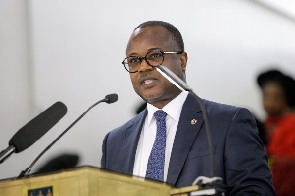 First Deputy Governor of the Bank of Ghana, Dr Maxwell Opoku-Afari
First Deputy Governor of the Bank of Ghana, Dr Maxwell Opoku-Afari
The First Deputy Governor of the Bank of Ghana, Dr Maxwell Opoku-Afari is calling for an improved tax administration in the country.
He said Ghana’s tax -to -GDP ratio is one of the lowest compared to its peers.
Citing an example, Dr Opoku-Afari said the ratio of tax revenue to GDP in 2020 was 13.4 percent compared to an average of 16 percent for Africa, 19.1 percent for Asia and Pacific region, 21.9 percent for Latin America and the Caribbean region and 33.5 percent in OECD.
This he indicated calls for broadening the tax base, upgrading tax policies, and revenue administration systems to mobilise more revenues.
Speaking at the National Development Conference organised by the Church of Pentecost, he indicated that broadening the tax base requires getting more people to honour their tax obligations and minimisation of tax exemptions.
Also, he suggested that business support incentives for tax compliance should be introduced to instill the discipline in all taxpayers to honour their tax obligations. In this regard, the Revenue Assurance and Compliance Enforcement initiative, will go a long way to block leakages and increase domestic resource mobilisation, widen the tax net and ensure compliance with tax obligations.
Furthermore, he said the recent introduction of the Ghana card means there is data on more employees and entities that fall within the tax bracket and, therefore, it is up to the Ghana Revenue Authority to reach out and bring all these potential taxpayers into the tax net as more people and entities are enrolled to pay tax, the per capita tax burden could be reduced through elimination of nuisance taxes, while raising the tax-GDP-ratio from a larger base.
Touching on efficiency in property tax collection, Dr Opoku-Afari stated Ghana suffers from underexploited taxes such as property taxes. In his view, the rapidly expanding real estate sector has the potential to boost domestic revenue mobilisation if efficient collection means are deployed.
He encouraged the government to take advantage of the digital technologies to enhance fairness, efficiency and accountability in tax collection.
On taxing the informal sector, the first deputy governor noted that Ghana, like in many African countries, the burden of taxation is not equitably distributed because of the large informal sector as a large segment of the eligible taxpayers is outside the tax net.
Citing an example, he said, a World Bank study showed that in SSA, almost 90% of the labour force is in the informal economy vs less than 15% for OECD countries. In addition, the informal economy is almost 40% of GDP in SSA, compared to just 18% of GDP in OECD countries. Under these circumstances, the tax system would neither be efficient nor equitable, hampering tax morale and therefore tax revenues.
To this end, he stated that the presence of a large informal sector implies that most of the existing tax systems inherited from the western countries may not be effective in mobilising domestic resources, therefore, reforms should be introduced in the revenue administration to enhance tax collection.
Using Georgia as a case study, Dr Opoku-Afari said the country Georgia introduced a simplified tax regime by establishing thresholds based on annual revenues for Micro, Small and Medium Enterprises. Those that fell within the Micro enterprise threshold were exempted from income tax. Firms classified as Small Enterprises had the option to be taxed based on revenue instead of profits at a rate of 3 or 5 percent. This was one of many tax reforms that had been introduced in the country. Other reforms to the tax code include eliminating “nuisance taxes” that had been generating little revenue and replacing the progressive income tax rate with a flat rate of 20 percent. Also, corporate income tax was also reduced to a flat rate of 15 percent.
He said the revenue lost from the lower tax rates was compensated by a broader tax base, better compliance and strict enforcement.
While acknowledging that the Georgia reforms may not be feasible in Ghana, Ghana can assess the environment and come up with reforms that will work for us.
He said the Georgia example shows that a well-thought through reforms can generate more revenues to support government programmes.
Finally, Dr Opoku-Afari strongly advised that issues of tax exemptions must be tackled urgently. In this regard, he said the IMF has identified removing VAT exemptions (which are estimated at close to 2 percent of GDP), phasing out tax holidays and exemptions and strengthening safeguards against profit shifting, and reducing customs exemptions as some of the tax measures that can be implemented to sustainably increase tax revenue.
He added that generous tax breaks offered to multinational corporations to attract investments to Ghana must be reviewed.